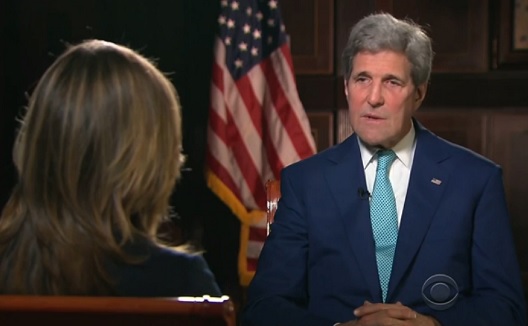 Over the weekend in Egypt, CBS News asked Secretary of State John Kerry in an interview if he would be willing to negotiate with Syria’s Bashar al-Assad. “Well,” said Kerry, “we have to negotiate in the end. We’ve always been willing to negotiate in the context of the Geneva I process.” In fact, the “Geneva I process” mandates negotiations between Syrians.
Over the weekend in Egypt, CBS News asked Secretary of State John Kerry in an interview if he would be willing to negotiate with Syria’s Bashar al-Assad. “Well,” said Kerry, “we have to negotiate in the end. We’ve always been willing to negotiate in the context of the Geneva I process.” In fact, the “Geneva I process” mandates negotiations between Syrians.
By mildly mis-speaking Kerry opened the door to policy change speculation. Reuters, noting that Kerry did not repeat (in the course of a brief exchange) the standard formulation about Assad having lost all legitimacy and therefore must go, speculated that the rise of the Islamic State (ISIS or ISIL) may be softening slightly the stance of the West toward Assad. Although it is hard to image a stance softer than that already in place, Kerry did not, in fact, signal a change in US policy. By citing the Geneva I process as the negotiating context, he upheld the policy that has been in place since June 30, 2012.
The Final Communique of the P-5 issued in Geneva on the last day of June 2012 called for all-Syrian negotiations to create a transitional governing body for the country: a body to be staffed with members selected based on mutual consent—meaning mutual veto—between opposition and regime negotiators.
The Communique specified that the body envisioned would exercise full executive power. All of the signatories understood that Assad could be part of, or even lead, the transitional governing body so long as the opposition consented to it: not likely, but hypothetically possible nonetheless. It is worth emphasizing that all of the signatories knew what they were signing when they signed it.
One of those signatories—Russia—would soon renege on its commitment, claiming (notwithstanding the full executive power provision) that the Syrian presidency and its associated security structures were exempt from political transition. Another of the signatories—the United States—fell into the habit of suggesting publicly that the Communique mandated regime change, arguing (not unreasonably) that the opposition would never consent to a governing role for Assad. P-5 consensus on Geneva I evaporated in the second half of 2012.
As Iranian-assembled foreign fighters rolled up one military success after another for Assad in mid-2013, the signatory believing the Communique mandated peaceful and inevitable regime change lobbied the signatory busily gutting the essence of the same Communique to help convene a Geneva II conference. The latter obliged most graciously, thereby permitting the inevitable to happen: a regime borne aloft militarily by foreign fighters and Russian ammunition resupply dispatched functionaries to Geneva to denounce the members of the opposition delegation as traitors.
Despite the best efforts of the United Nations Special Representative to make something respectable happen, Geneva II was every bit the fiasco sober analysts had predicted it would be for months. Iran, Russia, and the regime would naturally disagree. For them it was a gift. The United States had plunged headlong and at full speed into a diplomatic ambush and had dragged the West and the Syrian opposition along with it. Assad was so impressed by the proceedings that he granted himself another seven-year term a few months later, via ersatz elections.
John Kerry would, this past weekend, have made real news and done significant damage had he signaled willingness to support negotiations outside of the context of Geneva I. To abandon the Final Communique and its blueprint for Syria’s interim governance would be yet another gratuitous gift for those who have made daily habits of war crimes and crimes against humanity.
Indeed, in the brief time allotted to Syria in an interview devoted mainly to the Iran nuclear talks, Kerry went on to say that the United States is quietly assisting Syrian nationalist rebels, that pressure will have to be brought to bear on Assad to make him more amenable to genuine negotiations, and that Washington is considering a range of options to increase that pressure. All of this is good. It would have been even better in 2012 and 2013.
More precision on the part of the Secretary of State might have avoided altogether the wrong kinds of headlines and the associated confusion. He might have said something like: “It is not the role of the United States to negotiate with the Assad regime. The Geneva I Final Communique—which is our Bible in this matter—mandates negotiations between Syrians. We will support without reservation the full and faithful implementation of the Final Communique agreed to by the P-5 on June 30, 2012: an international agreement that vests in Syrian delegations the right of mutual consent to the names of those who will guide Syria, through the exercise of full executive power, on a path to reconstruction, reform, reconciliation, and ultimately governmental powers derived from the consent of the governed.”
Frederic C. Hof is a Senior Fellow with the Atlantic Council’s Rafik Hariri Center for the Middle East.
Image: Screenshot of US Secretary of State John Kerry in an interview with CBS, Sunday, March 15, 2015.
